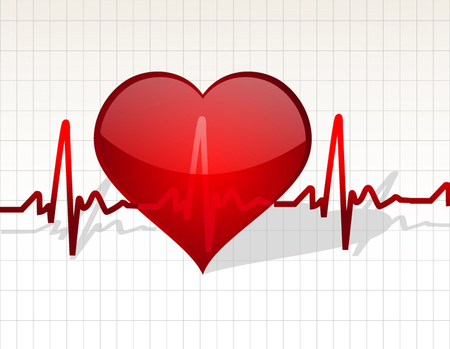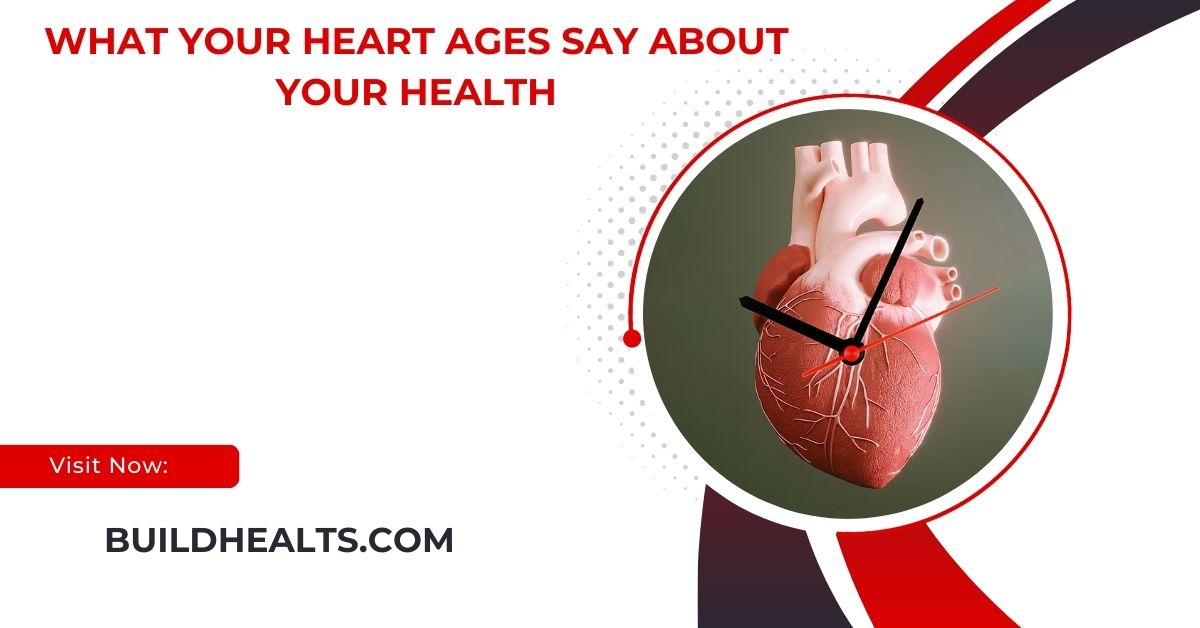Your heart age is a reflection of your heart’s health compared to your actual age. It shows if you’re at risk for heart disease, and improving lifestyle habits can lower your heart age, promoting better health.
This article will explore what heart age is, how it’s calculated, what it says about your health, and ways to improve it.
What Is Heart Age?

Heart age is a way of estimating the condition of your heart and its potential risks by comparing your cardiovascular health with that of an average person your age. If your heart age is younger than your actual age, it means your heart is healthier than average. However, if your heart age is older, it indicates that your heart may be at higher risk for health issues, such as heart disease, heart attacks, or strokes.
Heart age is calculated based on several risk factors, including:
- Blood pressure
- Cholesterol levels
- Smoking habits
- Diabetes status
- Body mass index (BMI)
- Physical activity
- Diet
How is Heart Age Calculated?
There are several online tools and health calculators that help estimate your heart age. These tools use your personal health information to compare your risk factors to the average person of the same age. By inputting details such as your blood pressure, cholesterol levels, smoking habits, and other factors, these calculators provide an estimate of your heart age.
For example, if you’re a 40-year-old person with high blood pressure, high cholesterol, and a smoking habit, your heart age may be calculated as 55. This means that your heart is functioning like that of a 55-year-old, increasing your risk of heart disease.
Also read: How Board Games Help Cognitive Health – A Complete Guide!
What Does Your Heart Age Say About Your Health?
Heart Age Younger Than Your Actual Age:
If your heart age is younger than your actual age, this is a positive sign. It means that your heart is in good condition and that you are likely taking steps to maintain your cardiovascular health. People with a younger heart age typically have:
- Normal blood pressure
- Healthy cholesterol levels
- A balanced diet
- Regular exercise habits
- No smoking history
A younger heart age suggests that you are less likely to experience heart-related health issues and that your lifestyle choices are benefiting your long-term health.
Heart Age Equal to Your Actual Age:

If your heart age matches your chronological age, it means that your heart is average for someone of your age group. While this is not a cause for concern, it still means that you could improve your heart health by adopting healthier lifestyle habits. Maintaining a balanced diet, exercising regularly, and managing stress can help keep your heart age in check.
Heart Age Older Than Your Actual Age:
If your heart age is older than your actual age, it’s a sign that you may be at a higher risk of heart disease. An older heart age is a warning that your cardiovascular health needs improvement. This situation usually arises due to:
- High blood pressure
- High cholesterol
- Smoking
- Poor diet
- Lack of physical activity
- Being overweight
An older heart age means your heart is aging faster than the rest of your body, and you are more likely to develop serious heart conditions if you don’t make lifestyle changes. This may lead to health problems like heart attacks, strokes, and other cardiovascular diseases.
Risk Factors That Affect Heart Age:
Several factors contribute to an older heart age, and understanding these risk factors can help you make changes to improve your heart health.
- High Blood Pressure: Puts extra strain on the heart, leading to artery damage and heart disease. Managing blood pressure through diet, exercise, and medication can lower heart age.
- High Cholesterol: Excess “bad” cholesterol clogs arteries, increasing heart attack risk. A healthy diet and medication can reduce cholesterol and improve heart health.
- Smoking: Damages arteries, raises blood pressure, and reduces oxygen, leading to an older heart age.Quitting smoking reduces the risk of heart disease.
- Poor Diet & Lack of Exercise: Diets high in processed foods and inactivity lead to high cholesterol, weight gain, and high blood pressure. A balanced diet and regular exercise improve heart health.
- Diabetes & Excess Weight: Diabetes and obesity increase heart disease risk. Proper weight management and diabetes control help lower heart age and improve overall heart health.
How to Improve Your Heart Age:
The good news is that even if your heart age is older than your actual age, you can take steps to improve it. Making lifestyle changes can significantly lower your heart age and reduce your risk of heart disease.
Also read: Putting Food Into Your Mouth Health Are Absorption – Tips for Better Digestion and Absorption!
Eat a Heart-Healthy Diet:
A healthy diet plays a crucial role in maintaining a younger heart age. Focus on eating foods that are good for your heart, such as:
- Fruits and vegetables
- Whole grains
- Lean proteins, such as fish and poultry
- Healthy fats, like those found in nuts, seeds, and olive oil
- Limit intake of processed foods, sugary snacks, and unhealthy fats
A balanced diet can help lower cholesterol, manage blood pressure, and control weight, all of which contribute to a younger heart age.
Exercise Regularly:
Physical activity strengthens your heart and improves circulation. Aim for at least 30 minutes of moderate exercise most days of the week. Activities like walking, jogging, swimming, and cycling can help improve your cardiovascular health and lower your heart age. If you’re new to exercise, start with low-impact activities and gradually increase the intensity.
Quit Smoking:
If you smoke, quitting is one of the best things you can do for your heart health. Within a few years of quitting, your risk of heart disease drops significantly, and your heart age will decrease. Seek support from friends, family, or a healthcare provider if you need help quitting.
Manage Stress:
Chronic stress can take a toll on your heart. Finding ways to manage stress, such as practicing mindfulness, meditation, or deep breathing exercises, can benefit your heart health. Taking time to relax and unwind is essential for maintaining a healthy heart.
Monitor Your Blood Pressure and Cholesterol:

Regular check-ups with your doctor can help you monitor your blood pressure and cholesterol levels. If either is high, your doctor may recommend lifestyle changes or medication to help manage them. Keeping these factors under control can lower your heart age and reduce your risk of heart disease.
Maintain a Healthy Weight:
Losing excess weight, especially around your waist, can have a significant impact on your heart age. Even a small amount of weight loss can improve your heart health and lower your risk of heart disease. Combining a healthy diet with regular exercise is the best way to achieve and maintain a healthy weight.
Why Heart Age Matters:
Understanding your heart age gives you a clear picture of your cardiovascular health and the risk of heart disease. It can serve as a wake-up call to make necessary changes to your lifestyle if your heart age is older than your actual age.
Knowing your heart age can also motivate you to take better care of your body. Simple changes like eating healthier, exercising, and quitting smoking can help reduce your heart age, leading to a longer and healthier life.
Also read: Who Is The Doctor At Adoue Family Health Center – Dr. [Name]’s Approach to Family Medicine!
FAQ’s
1. What is heart age?
Heart age is an estimate of your heart’s health compared to the average person your age, based on risk factors like blood pressure and cholesterol.
2. How can I lower my heart age?
You can lower your heart age by eating a heart-healthy diet, exercising regularly, quitting smoking, and managing stress.
3. What does it mean if my heart age is older than my actual age?
If your heart age is older, it indicates a higher risk of heart disease and suggests that your cardiovascular health needs improvement.
4. How is heart age calculated?
Heart age is calculated using factors like blood pressure, cholesterol levels, smoking habits, and BMI to estimate cardiovascular health risks.
5. Why does heart age matter?
Knowing your heart age helps you understand your risk for heart disease and can motivate you to adopt healthier habits for better heart health.
Conclusion
In conclusion, understanding your heart age is crucial for assessing your cardiovascular health and potential risks. If your heart age is older than your actual age, it’s a signal to adopt healthier habits, such as improving your diet, exercising, and quitting smoking. By making these changes, you can lower your heart age and enhance your long-term well-being.
Related post
- Also read: Who Will Pay For Articles On Health Food – Pays for Health Food Content!
- Also read: Intermountain Health Ironman 70.3 Triathlon Where Is Swimming Course – A Complete Guide!
- Also read: Ethical Issues in Health Communication: Health-Related News Sourcing Practices – Ethical Considerations in Health News!




